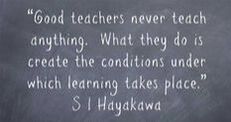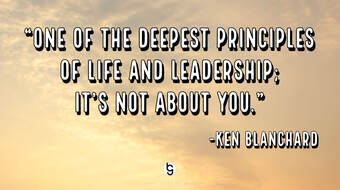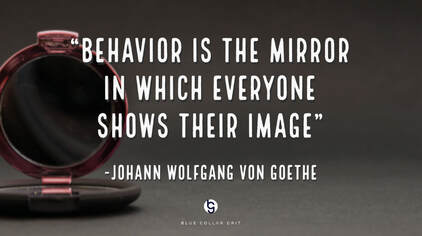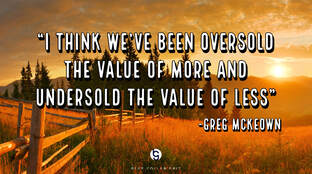At Their MercyAs a leader, you’re at the mercy of those you lead.
It’s an important perspective to accept. Your ego, and society, says you’re in control. You’re not. It’s never been more clear than it is right now. According to a recent CNBC article, over 4 million people have left their jobs each month in 2022. We are in a time when options abound and workers are not afraid to test the grass on the other side of the fence. This statistic also points to a void in understanding by leaders. Why Should We Care? When we can detach from our need to control, we open ourselves up to understanding our primary duty as a leader: to create the proper conditions that will allow growth and teamwork to take place. Leadership is less about getting the person to do something and more about creating the space and conditions that will allow the person to choose to be led. That’s a significant difference and requires a significantly different approach to leading. These conditions and space we want to create as leaders should be intimately tied to our vision for the team. When you close your eyes and think about the perfect performance by your team, what does it look like? How are people acting? What are they saying? These are the conditions you are creating. The better we paint the picture of our vision, the more people we attract that believe in the same things we believe in. These are the people we want on our team. While attracting the right people is critical, the other benefit of establishing the right conditions is that we push those that don’t believe in our vision to choose something else early in the process. And, we all know trouble just one bad apple can cause. The space to choose is powerful because of the commitment it evokes. Rather than being forced, or coerced, into doing something; we want to allow people to join our cause and vision because they believe in it. When we choose our path, we’re more likely to view the obstacles as simply part of the path and work through, around, and beyond them. When we don’t choose our path, the obstacles are more likely to be viewed as roadblocks not worth the struggle to navigate. REAL TALK - Action Steps Creating conditions and space for your vision to be considered and chosen isn’t an easy proposition for a leader. It’s much easier to simply pass down commands and punishment. Of course, easier is a terrible compass. Here are a few ideas to consider when creating those conditions and space, modified slightly from Daniel Coyle’s finding in The Culture Code.
While we don’t control those we lead, we certainly have a profound impact on what they ultimately choose to do. However, that impact swings both ways. As a leader, tie your rope more closely to the conditions you are creating rather than the directions you are giving. Detaching from this will allow you, as the leader, to realize you are merely holding the pen. For more information on building excellence in your teams, visit us at www.bluecollargrit.com. We would love to know how we could help!
1 Comment
It's Not About YouContrary to our intuition, others don’t see the world the same way that we do. They have different experiences that have formed different beliefs. This is as it should be.
Also contrary to our intuition, others don’t need to agree with us. Differing opinions provide different perspectives. This variety is the strength of the team, not a weakness. However, in order to appreciate this mindset, we have to remember the most important rule for any team: It’s not about you. If it’s about you, then it can’t be about the team. If it’s about the team, then it can’t be about you. Why Should We Care? Accepting, that’s right accepting, a position on a team is a significant decision one should give serious consideration. And, most don’t. By agreeing to become a member of a team, we are agreeing to surrender ourselves to the team. You can have goals, the team’s just have to be more important. The same applies to the ego. Our ego must be secondary to that of the team also. Elite teams have a collective confidence, belief that precedes them. It is driven by the individual egos on the team, but is collectively much greater than the sum of the individual parts. In a 1994 playoff game versus the New York Knicks, all-star Chicago Bulls player Scottie Pippen refused to go into the game when Coach Phil Jackson drew up the final, game-winning play, for Toni Kukoc instead of Pippen. Kukoc made the shot to win the game and Pippen went directly to the locker room rather than celebrating with his team. Clearly, in Pippen’s mind, it was about him, not the team - at least in that moment. Jackson, a hall of fame coach, handled it exactly as you would expect. He left Pippen on the bench. We should take note and do the same with team members prioritizing themselves over the team. REAL TALK - Action Steps Clear situations like the one above aren’t as difficult to identify and respond to as some of the less egregious acts are. Below are a few ways to identify teammates that might think it is, in fact, about them.
The realization that when you’re on a team, nothing is about you is a humbling one. Consider it practice for other important aspects of your life that will require a similar type of surrendering. Your friends, your family, and your faith to name a few. For more information on building excellence in your teams, visit us at www.bluecollargrit.com. We would love to know how we could help! It's a Matter of DisciplineWe resist it, even when we understand it.
We don’t like it, even when those who want what’s best for us suggest it. We betray it, even when it paves the path for the results we aspire to. Yet, it persists. Never wavering in its commitment to progress. Never demanding credit or seeking the spotlight. Never compromising the right way for the easy way. Discipline is funny like that. We can try to deny it, but the reality of its necessity is not debatable. We’ve all experienced the excellence it can lead us to as well as the trouble it can keep us out of. In today’s society, discipline is truly the road less traveled. A quick glance at the popularity of diet fads and get rich quick schemes tells us all we need to know about our search for the easy way. Not only that, it’s now become practically vilified as a buzz word to avoid. Thankfully, the easy way never leads to the same place as the road less traveled. Why Should We Care? Discipline can’t be faked. It can’t be replaced. It can’t be avoided. That is, if excellence is the vision. There are few things we can choose to do that will have a bigger impact on our lives than establishing a practice, and appreciation, for discipline. Consistency and persistence are the trump cards in the growth and development game. When all else fails, just keep showing up and doing the work. Progress provides the fulfillment we all long for in our pursuits. In our minds, we’re pursuing things but what we’re really after is the feeling we think that thing will deliver. This is precisely why so many people achieve something they’ve always dreamed of and suddenly have a feeling ‘that’s it’? The fulfillment was in the process. And, that progress wouldn’t have been possible without discipline. REAL TALK - Action Steps The good news is that discipline is a choice. The bad news is that we have to make it again over and over, day after day, even moment after moment. Here’s a few reminders when it comes to choosing discipline consistently.
I’m tired of people trying to act like discipline isn’t critical to growth, development, and the pursuit of anything worthwhile. We want to give it different names and fancy it up to be something it’s not. There’s nothing sexy about discipline. Accept it and do it because there’s also no replacing it. For more information on building excellence in your teams, visit us at www.bluecollargrit.com. We would love to know how we could help! What Game Are You Winning?I see it as a teacher and coach all the time.
Ultra-successful parents that are fully committed to their careers, successful by every professional measure, yet I wonder if they are truly winning. I suppose it depends on what they are trying to win. If they view success as financial prosperity, climbing the corporate ladder, and accumulating items of status; then they are, indeed, successful. Clearly, this is the accepted definition of success society has adopted. On the other hand, if they view success as involvement, support, and impact within their family; then many are failing miserably. At least, that’s the way it looks from where I’m sitting. Of course, nothing is to say these two extremes represent the only options. I think we all aspire to find the perfect balance where we avoid sacrificing any part of our life. But, aspiring to do something and actually doing it are two different things. Why Should We Care? The Stephen Covey quote “The main thing is to keep the main thing the main thing” would be a great coaching/teaching/parenting axiom … when you remember it. Unfortunately, it’s awfully easy to stray away from the main thing. Whether it’s as simple as a game plan or as complicated as our life choices, the challenge to keep the main thing the main thing remains the ultimate challenge. When we keep the main thing the main thing, the game we set out to win remains in the crosshairs of our focus. When we get pulled away from the main thing, we naturally drift to the societal norm. We become controlled by our emotions and circumstances. Instead of striving to win our game, we become consumed with the peripheral. Spend too much time in the peripheral and you soon forget the game you set out to win in the first place. Of course, some simply set out to win society’s game to start with. They’re often good at it. However, I am convinced that everyone eventually realizes exactly what the main thing is. Hopefully before we are lying on our deathbed; but, if not, I’m confident we’ll realize it then. And, I’ve never heard, or read, about someone wishing for more time to chase those societal successes at that point. REAL TALK - Action Steps While there are many things in life that can distract us from the main things, it is always our choice. Remaining intentional during the times below will go a long way in helping you stay centered on the game you set out to win.
So, what game are you winning? Is it one you can stand on throughout your life or is it a game centered on your status and ego? Are you aware and intentional about keeping the main thing the main thing? Does the game you’re trying to win reflect the priorities in your life? Questions worth considering. For more information on building excellence in your teams, visit us at www.bluecollargrit.com. We would love to know how we could help! More, More, MoreThe paradox of success says that success itself is often a catalyst for failure. The more success we have, the more opportunities that surface and the more opportunities we are presented with. In our consistent pursuit of more, we typically run through those newly opened doors.
After all, more has to be better, right? More clothes, more shoes, more cars, more money, more friends, more admiration, more respect is what we all pursue. We not only do everything we can to achieve these things, but we also love to attach our value and worth to it. The more money we make, the more powerful we are. The more wins we have, the more respect we deserve. We love the relentless pursuit of more. Until we don’t. Why Should We Care? There comes a time in our life when more isn’t enough, when we realize more doesn’t provide the satisfaction we once thought it did. We realize that far more things in life are non-essential than we would like to admit. We finally accept that almost everything is noise. And, more of it is just more noise. The thing that sets excellent leaders, and people, apart from everyone else is that they are able to identify the critical few. And, just as importantly, disregard the trivial many. They stay committed to the most important, never tiring of the simple or mundane. For a clear example of the value in focusing on the critical few, look no further than fast food restaurants. While there are plenty of food chains offering a wide variety of options, those that are considered excellent typically narrow their focus. Chick-fil-A and Cane’s are dedicated to chicken while Five Guys sticks with hamburgers. The quality they provide is not a coincidence. They’ve identified their critical few. The same is true for us in our personal life and our leadership journey. We are at our best when we have clarity around our priorities. Our core values and purpose can provide this for us if we are open to doing the work to discover it. Rather than striving for more of the non-essential we need to become disciplined in the things that matter the most. REAL TALK - Action Steps In his book Essentialism, Greg McKeown identifies a three step process to focusing on the most important items.
Choosing to focus on the important, eliminating the other things that don’t really matter, and accepting that we can do anything but not everything is one of the most important steps on the path to excellence. The sooner we grasp the value of less, the better leaders we will be. For more information on building excellence in your teams, visit us at www.bluecollargrit.com. We would love to know how we could help! |
About bcI'm a teacher, coach, and parent seeking excellence while defining success on my own terms. Archives
July 2024
Categories |






 RSS Feed
RSS Feed